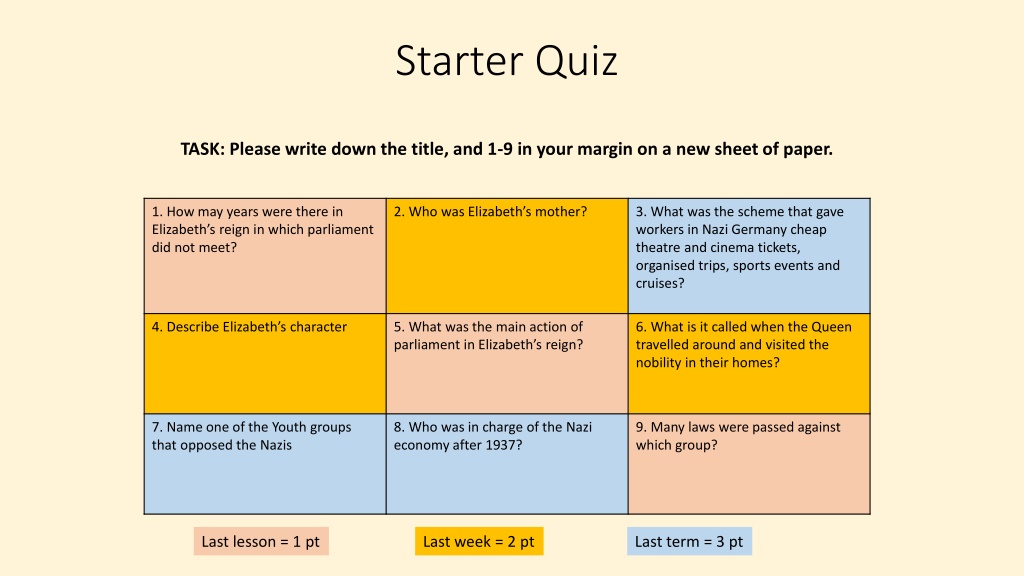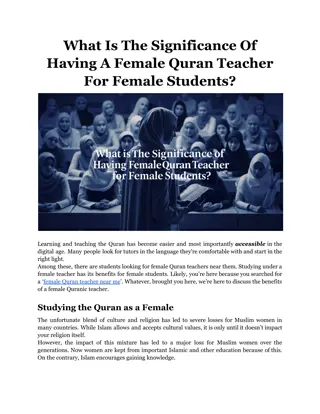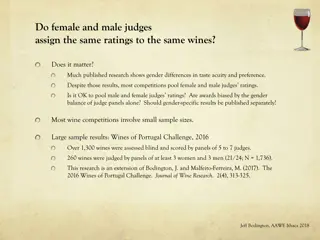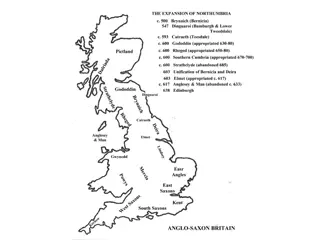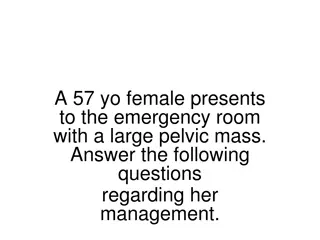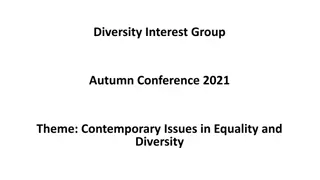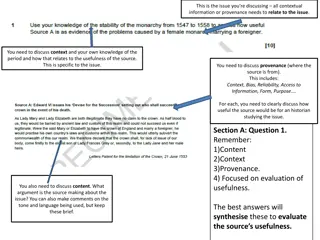Challenges Faced by Female Rulers in History
The challenges encountered by female rulers in history, like Queen Elizabeth I, are explored in this content. From societal attitudes towards women in Tudor times to the pressures to marry and produce heirs, the struggles faced by female monarchs are highlighted. The content delves into historical events, such as Elizabeth's reign and the succession crisis, shedding light on the complexities of ruling as a woman in a predominantly male-dominated world.
Download Presentation

Please find below an Image/Link to download the presentation.
The content on the website is provided AS IS for your information and personal use only. It may not be sold, licensed, or shared on other websites without obtaining consent from the author.If you encounter any issues during the download, it is possible that the publisher has removed the file from their server.
You are allowed to download the files provided on this website for personal or commercial use, subject to the condition that they are used lawfully. All files are the property of their respective owners.
The content on the website is provided AS IS for your information and personal use only. It may not be sold, licensed, or shared on other websites without obtaining consent from the author.
E N D
Presentation Transcript
Starter Quiz TASK: Please write down the title, and 1-9 in your margin on a new sheet of paper. 1. How may years were there in Elizabeth s reign in which parliament did not meet? 2. Who was Elizabeth s mother? 3. What was the scheme that gave workers in Nazi Germany cheap theatre and cinema tickets, organised trips, sports events and cruises? 4. Describe Elizabeth s character 5. What was the main action of parliament in Elizabeth s reign? 6. What is it called when the Queen travelled around and visited the nobility in their homes? 7. Name one of the Youth groups that opposed the Nazis 8. Who was in charge of the Nazi economy after 1937? 9. Many laws were passed against which group? Last lesson = 1 pt Last week = 2 pt Last term = 3 pt
Last lesson = 1 pt Last week = 2 pt Last term = 3 pt 1. 29 years 2. Anne Boleyn 3. Strength through Joy 4. Cautious, clever and courageous 5. Raise taxes 6. Progresses 7. The Swing youth or the Edelweiss Pirates 8. Goring 9. Catholics 1. Give yourself a score out of 18 2. In a green pen, you are going to write down which topic you need to develop you understanding of (Elizabeth and Parliament ; Elizabeth, background, character and court; Nazi Germany) 3. For next lesson you need to create revision material on that topic. In that next lesson, you will be given a new quiz just on the topic you are revising.
Elizabeth Lesson 5: The Difficulties for a female Ruler-The Succession Crisis Even better: Good learning: Great learning: Evaluate the pros and cons of different suitors whether Elizabeth made the right decisions in staying unmarried and not naming an heir Understand attitudes to women, marriage and succession in Tudor times Explain the pressure for Elizabeth to marry Key Words: Succession, suitor, heir, Cult of Personality, subject, small pox
Starkey introduction Intro Women- 0- 2.07 https://www.youtube.com/watch?v=q0BEaSnadtQ Complete the first section of the Documentary capture sheet
Understand attitudes to women in Tudor times England in the 16thCentury was certainly a man s world. There was not a history of female rulers, Mary I (Elizabeth s sister) was the first Queen to rule in her own right, her marriage to King Philip of Spain had concerned people over England s independence and her reign was not viewed positively with economic, political, foreign policy and religious problems. 1. 1. Which of the points opposite most strongly suggest that a female ruler would face difficulties? 2. Read the second paragraph on page 27, what evidence can you find that suggest being a woman might not be a disadvantage for Elizabeth 2. Henry VIII had taken drastic action to have a male heirs including splitting with the Catholic church and having 6 wives. 3. At the time people believed that women were not intellectually or temperamentally to reign. People believed that a female ruler would be weak and not be able to make the decisions that a male ruler could. They also believed that a women may not be able to control male subjects and significantly could not lead their army into battle. 4. John Knox a leading Scottish religious leader wrote The First Blast of the Monstrous Trumpet Against Women , which attacked women rulers.The book was aimed Mary I of England and Marie de Guise (French mother of Mary Queen of Scots) who had ruled in Scotland
Understand attitudes to marriage in Tudor times Women general got married when young (often as teenagers), Elizabeth was 25 when she became Queen. Royal and noble women would not have a choice in who they married, their fathers would marry them off for political and financial advantage. According to marriage vows as taken in Tudor times a wife would honour and obey her husband. It was unclear how this would work if Elizabeth married: if she married a foreign royal would he then control England; if she married an English man would she obey one of her own subjects? Elizabeth s life experiences were likely to make her wary of marriage: her dad executed her mum and was married 6 times in total; two of her step mums died following child birth; her experiences with Thomas Seymour; the fact that her sisters marriage caused a rebellion and led to Elizabeth being suspected of treason. 1. Write a diary entry as if you were Elizabeth about your thoughts on marriage following becoming Queen
Starkey Clips on Marriage- Marriage 5.10- 9.40 of Starkey Part 2 https://www.youtube.com/watch?v=q0BEaSnadtQ Complete the second part of the Capture Sheet Marriage Anjou- 8.01-16.50 of Starkey Part 3 https://www.youtube.com/watch?v=d0S6xhuf4hc Complete the third part of the Capture Sheet
Evaluate the pros and cons of different suitors As we have already seen many people were not convinced that a woman could successfully rule by herself. The fact that Elizabeth would be the last Tudor unless she married and had a child increased the pressure for her to marry. However people were not united on who Elizabeth should marry. Should she marry a foreign royal? Or an English man? Did they have to be Protestant or could they be Catholic? Even discussing the issue was risky- Elizabeth was furious when Parliament raised the issue and banned them from raising it again. Peter Wentworth MP was arrested in 1576 for talking about it. Different Suitors: King Philip of Spain Prince Eric of Sweden Charles of Austria Robert Dudley Duke of Alencon (Anjou) You are Elizabeth s advisor: For each of the above produce pros and cons for whether Elizabeth should marry them
Understand attitudes to succession in Tudor times Henry VIII split with the Catholic Church and married 6 times in his quest to have heirs to the throne. If Elizabeth did not have any children then the Tudor dynasty would come to an end. Childbirth was very risky and it was unclear who would take the thrown if Elizabeth died. Elizabeth feared that naming a successor would essentially be signing her own death warrant as a faction would build around them. When Elizabeth contracted smallpox and was desperately ill in 1562 it became clear that there was a lack of suitable heirs causing a great deal of concern and increasing pressure on Elizabeth to marry when she recovered. Following the rule of two queens many wanted a return to a male ruler. 1. Explain the problems in naming the following as Elizabeth s heir: Mary Queen of Scots, Catherine Grey, Mary Grey 2. Read Resolution on p30 Why was James a good choice to succeed Elizabeth?
Evaluate whether Elizabeth made the right decisions in staying unmarried and not naming an heir 1. Make a list of the reasons for and against Elizabeth getting married and give each a score out of 5 for how strong it was. What is your overall judgement? 2. If Elizabeth was to have married when would you think was the best time? And to whom? 3. Was Elizabeth right to not name an heir? 4. If you had to advisor her to name an heir, who would you suggest? When?
